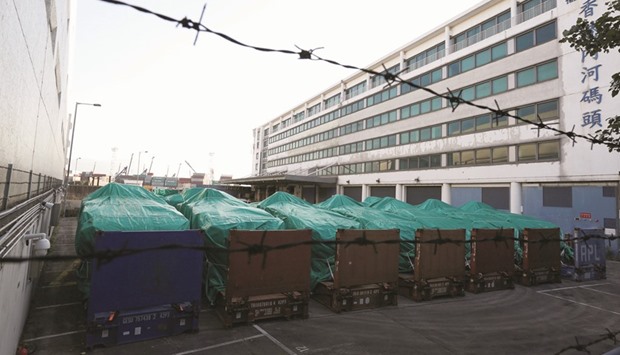As the impounding of Singaporean troop carriers in Hong Kong exposes rising tensions between China and Singapore, the Lion City is unlikely to budge on core security interests concerning Beijing - its military relationship with Taiwan, worries over the South China Sea and its hosting of the US military.
Singaporean officials, retired military officers and analysts stress that even while Singapore publicly plays down the spat, its leadership will not easily give in to what it sees as intimidation on matters of national importance.
All three points - Taiwan, the South China Sea and its deepening relationship with the Pentagon - reflect positions refined over decades as the tiny island state seeks to secure itself in a region now undergoing historic strategic shifts amid China’s rise.
But those shifts mean the pressure is intensifying and Singapore risks being isolated as neighbours including the Philippines, a US ally, and Malaysia tilt towards Beijing.
“Singapore will not be bullied and backed up against a wall,” said Tim Huxley, an expert on Singapore’s military at the International Institute for Strategic Studies. “(It) will take a determined stand on issues that it sees as important - and the importance of the issues at hand should not be underestimated.”
Hong Kong customs last week seized nine armoured troop carriers being shipped from Taiwan to Singapore after military exercises, prompting warnings from Beijing about maintaining ties with an island it regards as a breakaway province.
The dispute has erupted at a period of apparent vulnerability for Singapore, with its economy slowing and questions over the trade and security policies of incoming US President Donald Trump.
Singapore has enhanced its long standing security relations with Washington over the last 18 months, and now hosts revolving deployments of vessels and US P-8 surveillance planes that regional military sources say routinely target Chinese submarines.
While not a formal US alliance partner, regional diplomats say it has become Washington’s most important military relationship in Southeast Asia - more so since President Rodrigo Duterte’s Philippine election win.
The shift has not gone unnoticed in Beijing.
“Singapore has gone from being seen as a useful facilitator of US-China relations to being in the vanguard of an anti-China coalition, particularly on the South China Sea,” said Zhang Baohui, a mainland security scholar at Hong Kong’s Lingnan University. “The days of Beijing comfortably seeing Singapore has vaguely neutral are over, and it is reacting accordingly.”
China will find Singapore harder to crack than other countries in its orbit, however, as it less beholden to Chinese security or economic pressure, given its advanced market status and international security relationships, including with the United States, he said.
“China will find Singapore defiant and able to withstand pressure, but Singapore will find itself losing influence and more isolated within Southeast Asia as countries increasingly look to China,” Zhang said.
Since the seizure of the armoured vehicles, Beijing has stressed its opposition to any form of official contact with Taiwan.
The influential state-run tabloid, the Global Times, has been more strident, suggesting the carriers should be “melted down”. While other state media have run commentaries critical of Singapore through the year, they have been quiet on the troop carrier impounding.
Singapore has discreetly circulated thousands of troops a year through Taiwan since 1975 - a presence that survived formalising ties with Beijing under a “one China” policy in the early 1990s.
While Singapore increasingly exploits facilities in Australia and India, as well as sending troops to Brunei and Thailand, Taiwan remains an important to Singapore given the depth of military links and diverse training options, experts and retired Singaporean officers say.
Singapore has also played a role as a diplomatic bridge between the two sides, most recently hosting the historic meeting between outgoing Taiwanese President Ma Ying-jeou and Chinese President Xi Jinping in November 2015.
Singapore’s Minister of Foreign Affairs Vivian Balakrishnan this week sought to play down the seizure, saying it was “not a strategic incident” and that Singapore’s relationship with Taiwan was known to China.
But behind the scenes, regional diplomats say their Chinese counterparts are also making clear their rising concern at US surveillance activities off coasts from assets stationed around the region.
Advanced P-8 aircraft especially are viewed by Chinese strategists as a threat to Beijing’s evolving nuclear deterrent, centred on ballistic missile submarines stationed on Hainan Island.
“They are relentless on this point,” one Western diplomat said. “They don’t want to accept it as normal in any way.”
Chinese officials and state media have accused Singapore of internationalising matters in the South China Sea, where it is not a claimant.
While Singapore insists it does not take sides in the disputes, it has stressed the importance of freedom of navigation and international norms.
As negotiations continue over the fate of the troop carriers, Singapore’s ambassador-at-Large Bilahari Kausikan made clear the issues went deeper than military materiel.
Contemporary China was “curious mixture of assertiveness and insecurity”, Kausikan wrote on Facebook this week, adding he believed its leaders wanted to preserve the broader relationship.
“We are a small country and larger countries - not just China - routinely try intimidation.
But because China wants us to accept the appellation of ‘Chinese country’ and because so many Singaporeans are of Chinese descent, their actions have a special resonance.” - Reuters

Armoured troop carriers, belonging to Singapore, are detained at a cargo terminal in Hong Kong, China.
